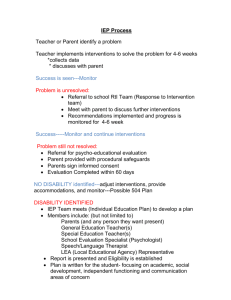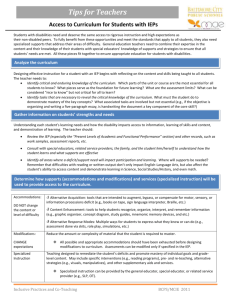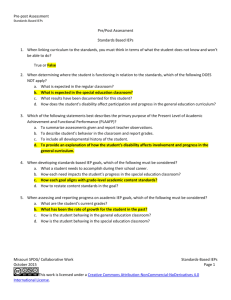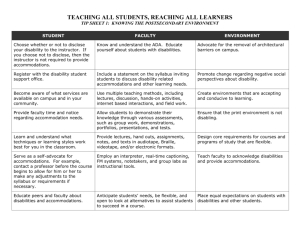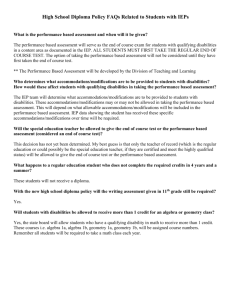Helps for Students with Disabilities
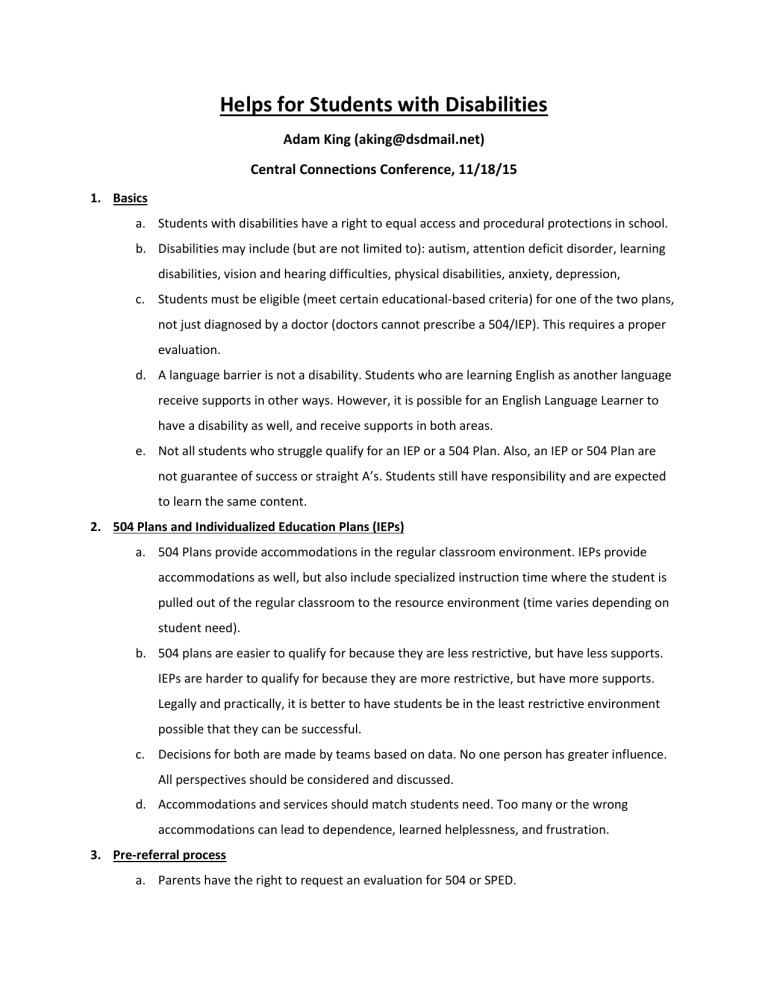
Helps for Students with Disabilities
Adam King (aking@dsdmail.net)
Central Connections Conference, 11/18/15
1.
Basics a.
Students with disabilities have a right to equal access and procedural protections in school. b.
Disabilities may include (but are not limited to): autism, attention deficit disorder, learning disabilities, vision and hearing difficulties, physical disabilities, anxiety, depression, c.
Students must be eligible (meet certain educational-based criteria) for one of the two plans, not just diagnosed by a doctor (doctors cannot prescribe a 504/IEP). This requires a proper evaluation. d.
A language barrier is not a disability. Students who are learning English as another language receive supports in other ways. However, it is possible for an English Language Learner to have a disability as well, and receive supports in both areas. e.
Not all students who struggle qualify for an IEP or a 504 Plan. Also, an IEP or 504 Plan are not guarantee of success or straight A’s. Students still have responsibility and are expected to learn the same content.
2.
504 Plans and Individualized Education Plans (IEPs) a.
504 Plans provide accommodations in the regular classroom environment. IEPs provide accommodations as well, but also include specialized instruction time where the student is pulled out of the regular classroom to the resource environment (time varies depending on student need). b.
504 plans are easier to qualify for because they are less restrictive, but have less supports.
IEPs are harder to qualify for because they are more restrictive, but have more supports.
Legally and practically, it is better to have students be in the least restrictive environment possible that they can be successful. c.
Decisions for both are made by teams based on data. No one person has greater influence.
All perspectives should be considered and discussed. d.
Accommodations and services should match students need. Too many or the wrong accommodations can lead to dependence, learned helplessness, and frustration.
3.
Pre-referral process a.
Parents have the right to request an evaluation for 504 or SPED.
b.
Teachers and other educators should notice if a student is struggling and meet together to try to find appropriate interventions. c.
A school team will often try out interventions for the student as part of the pre-referral or evaluation process. This is important because we need to see if an accommodation will work before we put it on the plan later.
4.
Communicating with the school a.
Be patient and work to build positive relationships b.
Talk about problems or concerns early c.
Follow a progression: Teacher, Vice Principal, Principal, District 504 or SPED personal d.
Realize that all team members want appropriate services for the student, but there may be differing opinions about how to get there. All opinions have some merit; that is why we work as a team. e.
Document phone and in-person conversations, and use email. f.
Always double check with the people involved before going to social media
5.
Strategies for home a.
Read to and with your kids. b.
Have a structured routine after school for study time, backpack checks, etc. c.
Have a designated space for backpacks and homework d.
Limit TV and video games; monitor until after homework is done e.
Provide incentives and rewards; hold high expectations f.
Fade supports as students learn skills g.
Check on student grades regularly h.
Remember that skills are often more important that grades i.
Keep the big picture in mind as you deal with day to day crisis j.
Understand Executive Functioning. These are the management skills that are taken care of by the frontal lobe of the brain; and which are often damaged as part of a disability. At any rate, they are still developing in adolescence and explicit training. The executive functions are: Planning, Organization, Time Management, Working Memory, Metacognition, Response
Inhibition, Emotional Control, Sustained Attention, Task Initiation, Flexibility, and Goal-
Directed Persistence. i.
Check out the book “Smart but Scattered” by Peg Dawson and Richard Guare. I highly recommend it!

